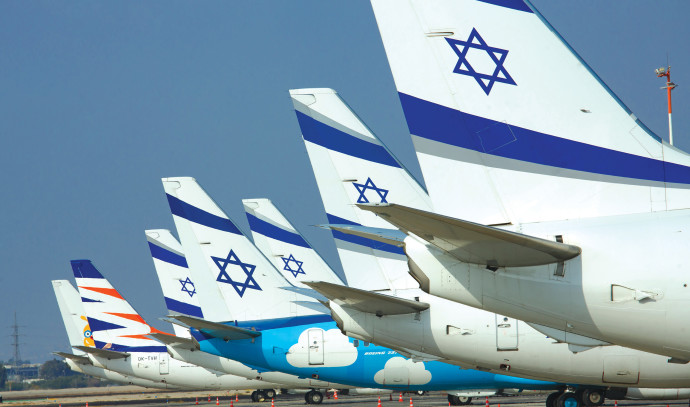El Al has had a checkered history of late, having dealt successfully with their unions and coming through the pandemic with a new team, new ideas, and new staff.
A new owner, Kenneth Rozenberg, a recent immigrant from the United States, injected millions into El Al along with a vital cash injection from the Israeli government.
Simultaneously, the number of employees was reduced dramatically, allowing El Al to exit the pandemic as a far leaner airline. There was a palpable change among personnel; El Al managed to recruit a lot of younger workers, and those who remained understood that the major changes by both the new owner and the new CEO had to be initiated for the good of the company.
Most El Al flyers in the past year have noticed a strong dedication to service when flying the carrier, and their King David Lounge at Ben-Gurion Airport remains the envy of all other airlines that fly out of the airport.
Nothing ever goes smoothly in the aviation industry; poor weather, disgruntled labor unions, equipment issues… there seems to be almost a daily challenge.
Recently, the State of New York announced a lawsuit against Rozenberg and the deputy chairman of the El Al board, Daryl Hagle.
The lawsuit accuses them of misappropriation of $83 million received by their nursing homes-Centers Health Care. The legal action against the Centers Health Care is that the public funds received for the welfare of the nursing home residents were instead used for their own personal use and to purchase El Al. Nursing home scandals are sadly quite common, but at this stage, both men are considered innocent until proven guilty.
Their investment in El Al has proved to be a fantastic shot in the arm and El Al has come out of the pandemic with flying colors, so the worry that the money might have been tainted has El Al employees concerned.
Almost simultaneously with the lawsuit, El Al announced a strategic partnership with Delta that significantly strengthens El Al’s role in the profitable North American market. This is a massive achievement for El Al management and may prove to be a game-changer in El Al’s future.
LET ME regress: There are three major global airline alliances: One World, Star Alliance, and Sky Team. Each comprises several airlines and membership in any of the alliances requires unanimous approval.
The attraction of an alliance is quite alluring. A member of one airline in an alliance can accumulate miles when flying with a partner airline. An example is United Airlines, part of Star Alliance. A customer on United will be able to amass frequent flier miles when flying Air Canada, that is also a member of Star Alliance.
Moreover, travelers can redeem their miles on any of the airlines in the alliance. In fact, Star Alliance has dominated the North American landscape by creating one fare basis for several of the Star Alliance airlines that fly from Tel Aviv to North America.
This makes it attractive to consumers knowing they can mix and match a half dozen airlines on their trip to North America – all with identical airfares and conditions. As a result, many clients plan their trips using the airline alliance as a major criterion.
These alliances were founded in the late 1990s, yet El Al has been rejected by all three alliances several times. Whether it’s because El Al only operates six days a week, or simply a matter of antisemitism has never been proven, but the lack of any reciprocity has always been a detriment.
As the United States was commencing its Fourth of July celebrations, El Al and later Delta announced their historic strategic partnership.
This declaration, while short on details, did spell out some major agreements:
In early 2024, the cooperation with Delta will include a reciprocal frequent flier agreement that will allow El Al frequent flier members to earn and redeem points for Delta flights, and vice versa. This is a major accomplishment for El Al, as its clients will able to choose between the two airlines based on pricing, scheduling, and type of equipment. No longer will the El Al frequent flier be limited to one airline flying the transatlantic route.
With Delta flying to JFK, Boston, and Atlanta, the El Al consumer will benefit greatly. So, too, will the Delta frequent flier be able to fly El Al and earn miles on Delta’s frequent flier program. It is still too early to see how the redemption of the miles earned can be applied to each airline. El Al has revamped its entire frequent flier program with a massive roll out planned for later this fall.
Promising a better program
El Al has promised a far better program with an easier interface; to date, their site is anything but user-friendly.
Initially, customers connecting onto Delta or El Al’s planes will be able to check in for their entire journey, with boarding passes checked through to their final destination.
El Al’s network inside the US has been limited to a few carriers, American and JetBlue being the largest. Delta offers almost 200 same-day connections, which will result in El Al being able to compete with both United and American Airlines, which also fly nonstop to the United States.
The CEO of El Al, Dina Ben Tal Ganancia, deserves huge congratulations for making this happen. Her staff has implemented a strategic plan to improve options on North American routes. El Al may have abandoned Canada, leaving Air Canada the only airline flying nonstop to Toronto from Tel Aviv, but this agreement with Delta will have a positive effect on El Al’s profitability.
Whispers abound that perhaps this will also strengthen El Al’s desire to join the Sky Team alliance, but experts concur this is still a few years down the road.
Delta Airlines
DELTA’S BENEFITS are less apparent from this side of the ocean. Working closely with El Al will further strengthen Delta’s connection to Israel by offering more customers unrivaled access to destinations. Matteo Curcio, Delta’s senior vice-president for Europe, Middle East, Africa, and India, said it quite clearly: “Enhanced partnerships are integral to our long-term strategy to better connect Delta customers around the world.”
Delta has realized that the US, while vitally important, is a mature market. Expect more agreements from Delta to initiate and increase partnerships in other regions of the world, be it Africa or the Far East. The traffic there is growing far faster than in US or European markets. The fact that both airlines use Terminal 4 in JFK Airport means that Delta’s domestic passengers can switch at JFK to El Al without switching terminals – a strong marketing message for Delta.
Delta, for the foreseeable future, only offers one nonstop flight from JFK, departing late at night. El Al has two daily, and often three daily flights from JFK, so once more the advantage goes to El Al. Nonetheless, if both airlines are touting this as a win-win, there is no reason to assume otherwise.
Not surprisingly, while United Airlines is staying mum to see how this partnership will play out, American Airlines recently announced yet another policy blocking the consumer and the travel agency industry from saving money. After American Airlines canceled its route from Miami to Tel Aviv, and scrapped plans to commence flights from Dallas, they have found a way to anger the entire travel industry with their latest edict.
Dynamic pricing has been an integral part of airline prices for years. It is an approach to setting the cost for a ticket that is highly flexible. The goal of dynamic pricing is to allow an airline that sells tickets to adjust prices on the fly in response to market demands. Both consumers and clients are cognizant that the price they “see” or receive from the travel agency is valid for one day only.
Vital to any transaction is the customer knowing exactly what the cancellation and changes are. This should be the first item asked when an airfare is quoted. We always tell our clients that while we can keep their reservation alive and kicking, until they actually decide to purchase it, the fare can change in either direction. It allows the client to decide to either purchase it at the price quoted or to wait longer to see if the fare will drop.
This basic tenet should be part and parcel of any purchase. Many agencies use sophisticated software that searches for lower fares, and entire industries have sprung up to support this. American Airlines has decided they don’t want the consumer to utilize such tools.
American Airlines
AMERICAN AIRLINES will now prohibit automated “re-shopping,” whether through an agency or through any third party. An entire category of price assurance technology arose because of the volatility of airline pricing. A business class ticket, for the same seat on the same plane, can fluctuate more than $1,000; in economy class, a difference of several hundred dollars is quite common.
For instance, if you purchase a business class ticket for $5,000 for a trip three months in the future, with a $300 cancellation fee, but closer to departure it drops to $4,000, American Airlines does not want you saving the $700. All travel management companies have been adamant about offering this ability to all clients. Now, included among what the airlines call “abusive practices that violate American Airlines’ rules” is this re-shopping.
An example of a true abusive practice would be selling a ticket to Washington DC via New York City, as the airfare to Washington is $50 less than the fare to NYC. What makes it abusive is if the client gets off in NYC rather than flying to DC.
American Airlines’ prohibition on re-shopping is both morally offensive and insulting to the consumer.
If American Airlines wants to set fares that only change every few months, then by all means it is their prerogative. But by using dynamic pricing, it opens up all airlines to having their fares monitored every day between booking and departure. While I sympathize with American’s loss of revenue, this new policy will be another reason for customers to shift business.
American Airlines is a legacy carrier with a long history of innovative practices. It is the largest airline in the world when measured by scheduled passengers carried and revenue passenger mile.
Its long, proud history begins when legendary aviator Charles Lindbergh, the chief pilot of Robertson Aircraft Corporation, stowed a bag of mail in his DH-4 biplane and took off from St. Louis to Chicago. It will soon be celebrating 100 years of service. Without any rancor, 2023 is proving a very bad year for American Airlines when it comes to public relations.
In January, American Airlines had to face accusations of racial discrimination after removing two black celebrities from flights, and is being sued in court by a black passenger for being kicked off a flight. When the NAACP, a group that describes itself as the oldest and largest nonpartisan civil rights organization in the US, issues a travel advisory warning passengers about their “safety and well-being” when flying with American Airlines, you know you have a serious image problem.
The public always has a choice on how, when, and which carrier to fly. It can be a matter of price or convenience, or frequent flier membership, but the airlines know that it is a matter of choice. Consumers demand good service, good pricing, and right up at the top of the list is flexibility. We live in uncertain times and no matter how assiduously we make our travel plans, hiccups can occur. When they do, travelers want to know if there is an airline that is there for them 24/7. And if the price drops, then they had better be able to benefit from it.
Last month saw the largest number of passengers pass through Ben-Gurion Airport, but this is a drop in the bucket in airline passengers worldwide.
El Al and Delta are well-positioned to benefit from this continued increase in passengers. Many airlines have pivoted in this direction, offering more services and greater flexibility. Any airline that opts to limit consumer freedom will find the wrath of the consumer quite painful.
Never forget – running an airline is like having a baby: fun to conceive, but hell to deliver.
Mark Feldman is the CEO of Ziontours, Jerusalem, and a director at Diesenhaus. For questions and comments, email him at [email protected]


